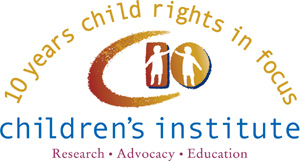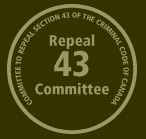Other countries don't allow assaults on children
The most up-to-date information on corporal punishment of children in other countries can be found on the Canadian website of the Repeal 43 Committee. The "Repeal 43" refers to section 43 of the Criminal Code of Canada which allows hitting children to discipline them. See www.Repeal43.org
Like Britain, countries such as Sweden, Finland, Norway, and Austria had a defence to assaults on children similar to our s. 43. These defences were removed between 1957 and 1977. The criminal law of these countries therefore gives children the same protection from assault as it gives adults. Beginning with Sweden in 1979, these countries also amended their civil child welfare laws to expressly prohibit corporal punishment so that the public fully understood it was illegal.
Other countries, such as Germany and Iceland, had no such defence in their criminal law. But recognizing the harm of corporal punishment and a need for clear understanding on the part of the public, they amended their civil child welfare laws to ensure that everyone understood that it was prohibited. The result is that the following countries have no defence similar to s. 43 in their criminal law and have specifically prohibited corporal punishment in their civil law in the years indicated.
1979 Sweden
1983 Finland
1987 Norway
1989 Austria
1994 Cyprus
1997 Denmark
1998 Latvia
1999 Croatia
2000 Israel
2000 Germany
2000 Bulgaria
2003 Iceland
2004 Romania
2004 Ukraine
2005 Hungary
2006 Greece
2007 Netherlands
2007 New Zealand
2007 Portugal
2007 Uruguay
2007 Venezuela
2007 Chile
2007 Spain
In 1994, the Supreme Court of Portugal declared all corporal punishment of children unlawful. 1996, the Supreme Court of Italy came to the same conclusion. In June 2005, the Council of Europe's Committee of Social Rights confirmed that although these judgments prohibited all corporal punishment, not enough education had taken place to make the public aware of these changes in the law. Including these two countries, a total of 23 have now prohibited all corporal punishment of children.
You can read the current list of countries that don't allow corporal punishment of children at the Repeal 43 Committee webpage at: www.Repeal43.org/international.html
University of Capetown Children's Institute, South Africa
Corporal punishment is outdated, illegal and has been found - contrary to what some parents may say - to be harmful rather than useful in instilling discipline.

So it was appropriate that UCT's Children Institute has called for the ban of this disciplinary measure on children, which they describe as "cruel and degrading". In their recent submission to the Department of Social Development, the Working Group on Positive Discipline, of which the institute is a member, has instead called for "positive discipline" - which focuses on long-term solutions and develop children's own discipline - to be meted out to children. Read More ..
![]()
Spanking hurts - more than you think
The Toronto Star, ( Canada's largest daily newspaper), by Jesse McLean, Staff reporter, September 28, 2009
Children who are spared a spanking grow up to have higher IQs than those who are physically disciplined, according to a study by one of North America's leading scholars on family violence.
Murray Straus examined the IQ scores of more than 1,500 children, divided in two groups - ages 2 to 4, and 5 to 9 - and compared them with IQ scores from four years later.
Straus found young children who had been slapped or spanked scored an average of five points lower on IQ tests than those who hadn't been hit. The discrepancy among the older age group was about 2.8 points.
"The bottom line is, kids need a lot of guidance and instruction. They just don't need to be hit," he said. Read More ..

